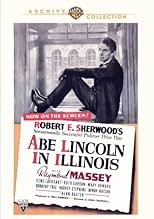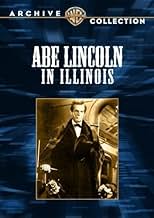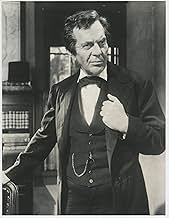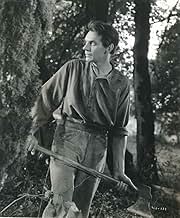IMDb RATING
7.3/10
2.1K
YOUR RATING
Humble Abraham Lincoln gains the respect of his Illinois neighbors, growing in stature and respect until he is elected President in 1860 and departs for Washington.Humble Abraham Lincoln gains the respect of his Illinois neighbors, growing in stature and respect until he is elected President in 1860 and departs for Washington.Humble Abraham Lincoln gains the respect of his Illinois neighbors, growing in stature and respect until he is elected President in 1860 and departs for Washington.
- Nominated for 2 Oscars
- 2 nominations total
Howard Da Silva
- Jack Armstrong
- (as Howard da Silva)
Storyline
Did you know
- TriviaAfter his success playing Lincoln in the film and on Broadway, Raymond Massey began to assume the character in real life. He often appeared at social gatherings dressed in Lincoln-esque attire, assuming a Lincoln-like manner and speech. His friend, the playwright George S. Kaufman, observed, "Massey won't be satisfied until someone assassinates him."
- GoofsWhen results for the 1860 election are being received, West Virginia is listed on the the state-by-state tally board. West Virginia didn't become a state until 1863, when it broke off from Virginia after that state had seceded from the Union.
- Quotes
Mentor Graham: Well, Abe, there are always two occupations open to those who have failed at everything else: school teaching and politics.
- ConnectionsFeatured in History Brought to Life (1950)
- SoundtracksOld Abe Lincoln Came Out of the Wilderness
(uncredited)
Traditional
Sung by chorus over opening credits
Featured review
Besides Raymond Massey, a whole flock of actors have been known for playing America's sixteenth president, Henry Fonda, Walter Huston, Sam Waterston, Hal Holbrook, Dennis Weaver, Gregory Peck, John Carradine. Character actor Frank McGlyn practically made a career of playing The Great Emancipator whenever Honest Abe was a character in a film. But the standard has been set by Raymond Massey who did Lincoln in Robert Sherwood's play for 472 performances on Broadway during the 1938-1939 season and he repeats the title role in Abe Lincoln in Illinois for this film version.
I've no doubt that Sherwood used as source material for his play a lot of information based on Carl Sandburg's biography, Lincoln the Prarie Years. At that time Sandburg was considered the unofficial custodian of the Lincoln legend and mythology. Of course he based a lot of his work on the biography of Lincoln written by his law partner William Herndon played here by Alan Baxter. Herndon's well known antipathy for Mary Todd Lincoln as the shrewish wife of his good friend comes through her in Ruth Gordon's portrayal. It should be said that Mary Lincoln regarded Herndon as an opportunist drunk and he certainly did have a substance abuse problem.
Gene Lockhart as Lincoln's rival Stephen A. Douglas is well done also, though Lockhart was a bit tall for the part. Had Douglas ever been elected president he would have been our shortest president, he was barely over five feet tall. The rivalry between these two was kind of like the Yankees and Red Sox with the Yankees always coming out on top until recent years. Lincoln is still our tallest president at 6'4" so the contrast on the speaking platform at the Lincoln-Douglas debates was really something to see.
The only other actor to recreate his stage role besides Massey was Howard DaSilva who played Jack Armstrong. Not the All American hero, but the leader of the local gang of roughnecks who Lincoln beat in a wrestling match and who becomes his lifelong friend. All part of the Lincoln legend carefully preserved by Sandburg and Sherwood. It was one of DaSilva's earliest screen roles.
Raymond Massey got an Academy Award nomination for Best Actor in 1940 and he was up against a strong field that included Henry Fonda for The Grapes of Wrath, Charles Chaplin for The Great Dictator, and Laurence Olivier in Rebecca. The winner however was a long-shot, James Stewart for The Philadelphia Story. There was a lot of sentiment that year that Stewart should have received the Oscar the year before for Mr. Smith Goes to Washington. So the good Academy voters made up for it this year. It goes that way with Oscar every so often.
Abe Lincoln in Illinois still holds up very well although today's historical Lincoln specialists might have different interpretations placed on some of the events you see.
I've no doubt that Sherwood used as source material for his play a lot of information based on Carl Sandburg's biography, Lincoln the Prarie Years. At that time Sandburg was considered the unofficial custodian of the Lincoln legend and mythology. Of course he based a lot of his work on the biography of Lincoln written by his law partner William Herndon played here by Alan Baxter. Herndon's well known antipathy for Mary Todd Lincoln as the shrewish wife of his good friend comes through her in Ruth Gordon's portrayal. It should be said that Mary Lincoln regarded Herndon as an opportunist drunk and he certainly did have a substance abuse problem.
Gene Lockhart as Lincoln's rival Stephen A. Douglas is well done also, though Lockhart was a bit tall for the part. Had Douglas ever been elected president he would have been our shortest president, he was barely over five feet tall. The rivalry between these two was kind of like the Yankees and Red Sox with the Yankees always coming out on top until recent years. Lincoln is still our tallest president at 6'4" so the contrast on the speaking platform at the Lincoln-Douglas debates was really something to see.
The only other actor to recreate his stage role besides Massey was Howard DaSilva who played Jack Armstrong. Not the All American hero, but the leader of the local gang of roughnecks who Lincoln beat in a wrestling match and who becomes his lifelong friend. All part of the Lincoln legend carefully preserved by Sandburg and Sherwood. It was one of DaSilva's earliest screen roles.
Raymond Massey got an Academy Award nomination for Best Actor in 1940 and he was up against a strong field that included Henry Fonda for The Grapes of Wrath, Charles Chaplin for The Great Dictator, and Laurence Olivier in Rebecca. The winner however was a long-shot, James Stewart for The Philadelphia Story. There was a lot of sentiment that year that Stewart should have received the Oscar the year before for Mr. Smith Goes to Washington. So the good Academy voters made up for it this year. It goes that way with Oscar every so often.
Abe Lincoln in Illinois still holds up very well although today's historical Lincoln specialists might have different interpretations placed on some of the events you see.
- bkoganbing
- Feb 10, 2008
- Permalink
- How long is Abe Lincoln in Illinois?Powered by Alexa
Details
Box office
- Gross US & Canada
- $1,451,880
- Runtime1 hour 50 minutes
- Color
- Aspect ratio
- 1.37 : 1
Contribute to this page
Suggest an edit or add missing content

Top Gap
By what name was Abe Lincoln in Illinois (1940) officially released in India in English?
Answer
























